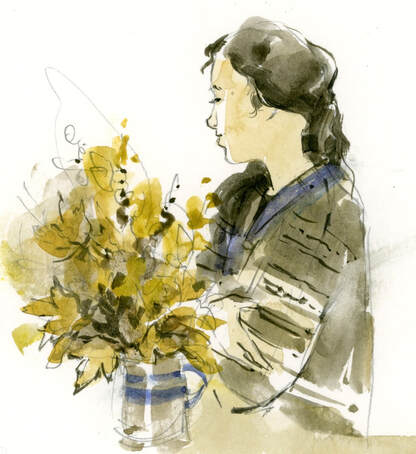Homage to My Literary Foremothers
By Angela Acosta
October 15, 2022
October 15, 2022
Spanish literary critics would have written her out of existence had Carmen Conde not written the date in her diary. While our lives overlapped by mere months, neither of us able to form coherent communication, I now bear witness to how she dutifully documented her carefully orchestrated life. Over years of fascist oppression, homophobia, and the scorn of her own husband, she eked out a life for herself with her partner, Amanda Junquera. In the dark, unmotivating months of winter dissertation writing, I often imagine them meeting with other writers at night in their dimly lit apartment in Madrid. In Velintonia they formed a veritable “Witches Academy” and debuted new works, some still lost to the library catalogue system. Carmen fervently wished for more life than the Spanish state would give her, a desire not unnoticed as I trace her wistful look in photographs.
Perhaps I will understand the full resonance of tributes when I seek remembrance for myself. Until then, I will create as many homages as I can, filling the annuls of herstory to ease the burden of exclusion and trouble the notion of “rescuing” women from a patriarchal oblivion. As a new doctoral student in Spanish literature, my friends told me that it would be hard to separate myself from my work. The deeper I went into the mire of research, the more I transformed Spanish women writers from the clay loam of long-gone muses into living, breathing spirits working alongside me. They told me stories of war-torn Madrid, the bright roar of an airplane taking flight in the 1920s, and of hard-won loves and losses in the Americas. I sought tributes to Spanish herstory, pledging my own admittance to the “Witches Academy” as I stood outside Velintonia. Yet, I remain one of the only twenty-first century members.
I’ve already written hundreds of pages expounding on literary theories and examining archival materials, but I still go back to the pictures of Carmen and Amanda at the Rock of Ifach. They were once alive, taking in the bright Spanish sun and impishly playing with beloved cats in Velintonia. Although well-worn tributes will confuse the details, they punctuate hours of solitary investigation and writing with moments of awe for the multitudes these women contained. Soon, I will dedicate my doctorate to all the misunderstood literary foremothers that now live in us, their chosen family.
Perhaps I will understand the full resonance of tributes when I seek remembrance for myself. Until then, I will create as many homages as I can, filling the annuls of herstory to ease the burden of exclusion and trouble the notion of “rescuing” women from a patriarchal oblivion. As a new doctoral student in Spanish literature, my friends told me that it would be hard to separate myself from my work. The deeper I went into the mire of research, the more I transformed Spanish women writers from the clay loam of long-gone muses into living, breathing spirits working alongside me. They told me stories of war-torn Madrid, the bright roar of an airplane taking flight in the 1920s, and of hard-won loves and losses in the Americas. I sought tributes to Spanish herstory, pledging my own admittance to the “Witches Academy” as I stood outside Velintonia. Yet, I remain one of the only twenty-first century members.
I’ve already written hundreds of pages expounding on literary theories and examining archival materials, but I still go back to the pictures of Carmen and Amanda at the Rock of Ifach. They were once alive, taking in the bright Spanish sun and impishly playing with beloved cats in Velintonia. Although well-worn tributes will confuse the details, they punctuate hours of solitary investigation and writing with moments of awe for the multitudes these women contained. Soon, I will dedicate my doctorate to all the misunderstood literary foremothers that now live in us, their chosen family.
|
Angela Acosta is a bilingual Latina poet and Ph.D. Candidate in Iberian Studies at The Ohio State University. She won the 2015 Rhina P. Espaillat Award from West Chester University and she was recently nominated for Best of the Net. Her work has appeared in Panochazine, Pluma, Toyon Literary Magazine, and Latinx Audio Lit Mag. Her first chapbook Fourth Generation Chicana Unicorn will be published by Dancing Girl Press in 2023.
|


